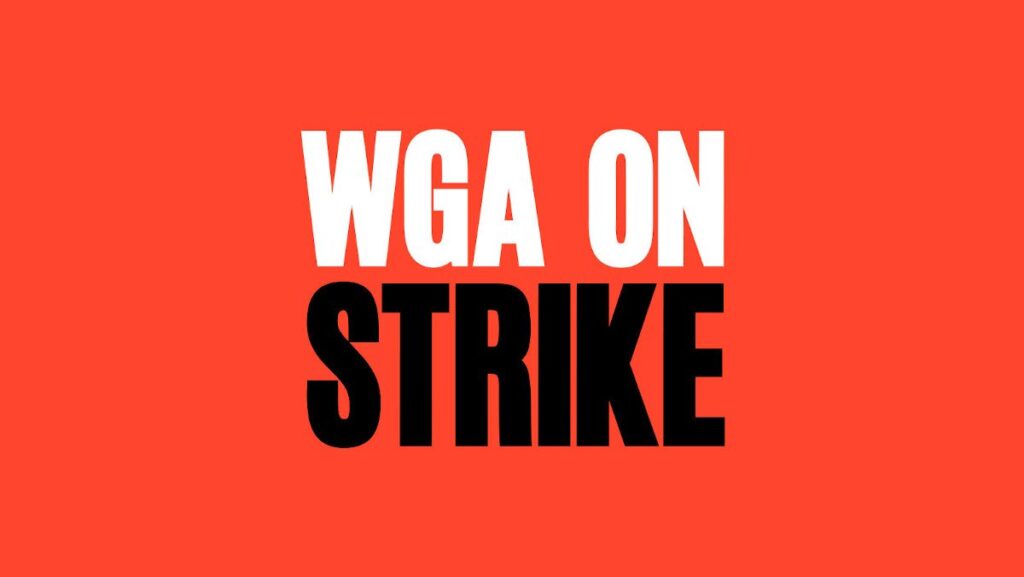The Writers Guild of America (WGA) moved forward with a strike on Tuesday morning after studios rejected the organization’s proposals for better compensation and equity for writers. A record percentage of guild members—97.85%—voted to authorize the strike. This is the group’s first strike since 2007, which lasted for 100 days. Nerdist covers a breadth of pop culture across film and television, none of which would exist without writers creating the stories we love. Here’s what you should know about the WGA strike.
Why Is the WGA Striking?
The WGA negotiating committee has been talking to the Alliance of Motion Picture and Television Producers (AMPTP) for the last six weeks. AMPTP negotiated on behalf of Netflix, Amazon, Apple, Disney, Discovery-Warner, NBC Universal, Paramount, and Sony. Streaming and the profound effect it has had upon writer compensation and residuals is at the heart of the negotiations.
In short, business practices from studios that have put streaming at the forefront have changed entertainment. That should trickle down to affect all aspects of the business, especially updating compensation and residual models. However, the payment structure for writers is set up as though entertainment has not drastically shifted. The prevalence of streaming cuts into a writer’s work airing and re-airing on broadcast TV and therefore cuts into residuals.
The WGA negotiated for members across all sectors for a fair deal that gives the writers compensation beyond that of a “a gig economy inside a union workforce.”
Streaming entertainment is not the only issue, though. The below details what the WGA is asking for:
COMPENSATION AND RESIDUALS
- Increase minimum compensation significantly to address the devaluation of writing in all areas of television, new media and features
- Standardize compensation and residual terms for features whether released theatrically or on streaming
- Address the abuses of mini-rooms
- Ensure appropriate television series writing compensation throughout entire process of pre-production, production and post-production
- Expand span protections to cover all television writers
- Apply MBA minimums to comedy-variety programs made for new media
- Increase residuals for under-compensated reuse markets
- Restrict uncompensated use of excerpts
PENSION PLAN AND HEALTH FUND
- Increase contributions to Pension Plan and Health Fund
PROFESSIONAL STANDARDS AND PROTECTION IN THE EMPLOYMENT OF WRITERS
- For feature contracts in which compensation falls below a specified threshold, require weekly payment of compensation and a minimum of two steps.
- Strengthen regulation of options and exclusivity in television writer employment contracts
- Regulate use of material produced using artificial intelligence or similar technologies
- Enact measures to combat discrimination and harassment and to promote pay equity
- Revise and expand all arbitrator lists
What Does the WGA Strike Mean?
Writers being on strike means the release of series and movies will slow down. The most immediately affected shows are late-night and talk shows. We’re approaching summer when writers would start working on fall series, so those will see delays. Shows currently filming can only continue to do so if they had completed work in hand before the strike, and specific rules apply to any writer-producers or writer-directors on set in regard to making changes to those scripts.
While shows nearing the end of their seasons may wrap up on time, the future of additional seasons will be uncertain. For example, the 2007-2008 WGA strike delayed several series or led to shortened seasons. Productions halted work. Some series were canceled. The consequences will add up, even if reality TV sees a brief boost.
It isn’t only about writers either. Some Teamsters are supporting the WGA’s strike and won’t cross picket lines.
How Can I Help?
The easiest way to help those on strike is to support the writers who create the content you love. The WGA represents over 11,000 members who write for movies, television, news, and online media. Boost their voices on social media, share your support with notes, and follow their guidance. The WGA has a social media toolkit you can use you show solidarity.
If you are able to join a picket line, do so. The WGA has a picket schedule on their site. Solidarity with writers is the key.
We will continue to update this post with relevant news.

